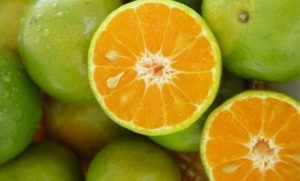Here comes the concentrated antioxidant power:
Vitamin E is indispensable in terms of body defense because it protects the cells from oxidative stress.
Find out why this is a benefit for your cognitive abilities in the following.
What Is Vitamin E?
Vitamin E is not just a single nutrient: Vitamin E combines various antioxidants that protect the body against free radicals.
In addition, fat-soluble vitamin E is one of the essential vitamins that can not be produced by the body itself.
Therefore: Vitamin E should be consumed regularly through food, so that the cells are optimally supplied.
In general, the E-vitamins primarily consist of four different tocopherols (alpha, beta, gamma
All occur naturally in plants and can be found in the cell walls of humans and animals – because of their antioxidant effect in cell protection.
The best-known micronutrient in the vitamin E group is alpha-tocopherol, which is most abundant in the body and accounts for up to 90 percent of the vitamin E content.
However, recent research has shown that this alpha form is the one with the worst antioxidant capabilities.
For example, gamma-tocopherol is much more effective at possibly inhibiting inflammation.
In addition, it has become apparent in recent years that the tocotrienols are the true heroes in the antioxidant complex.
They should be 40 to 60 times more effective than the previously highly praised alpha-tocopherol.
In addition, vitamin E unfolds its full effect only in combination with other vitamins, especially with vitamin C.
Since vitamin E as radical scavenger binds the free oxygen radicals and thus makes harmless, it needs another antioxidant for neutralization.
Take Home Message #1: Vitamin E is actually a family of different antioxidants. The most important of these are tocopherols and tocotrienols.
Capabilities of Vitamin E
When shopping you can barely oversee this:
Skin care products advertise with an addition of vitamin E because it is to protect skin and hair from aging and environmental influences.
Actually, there is even something true about it, because vitamin E primarily helps to protect the cells from oxidative stress.
Since our entire body consists of cells that are involved in all metabolic processes, vitamin E thus has a positive effect on many areas.
As a radical scavenger, it ensures, for example, that …
- skin does not age so fast.
immune s ystem works normally- protein metabolism works.
- the nervous system can do its job.
- brain cells are protected.
- Tissue and brain are supplied with oxygen.
- no deposits form in the blood vessels.
On the other hand, a positive influence on fertility could not be proven with certainty.
However, it was not disproved, which is why many men still rely on vitamin E as a boost for their virility and better sperm quality.
Take-home message #2: Vitamin E protects the cells from oxidative stress and is thus indispensable for many metabolic processes.
The Effect Of Vitamin E on the Brain and Muscles
In addition to supporting the immune system and inhibiting inflammation, tocotrienols are particularly interesting for cognitive abilities.
Researchers were able to find the first signs that it has a positive effect on the performance of the brain.
In addition, it seems after prolonged intake of 200 mg to protect your thinking apparatus from the spread of damage in the tissue.
Due to its lipophilic properties, vitamin E is very well absorbed by the brain cells and can develop its full protective power there.
However, in order to safely pursue this hypothesis, many more clinical studies are needed in this positive context.
Since most free radicals are formed in the brain and muscles during metabolism, adequate cell protection against oxidative stress is absolutely necessary here.
Athletes, especially in the high-performance sector, generate
Thus, an optimal supply of vitamin E is in the context of oxidative protection an excellent defense against injury of the muscle fibers.
Take-home message #3: The cells in the brain and muscles are particularly exposed to oxidative stress and need adequate protection against free radicals.
Vitamin E Deficiency
If the cells have too little vitamin E available, all bodily functions can be impaired.
The signs of vitamin E deficiency are therefore very versatile and can not always be specifically assigned.
Among other things, there are negative influences:
- concentration
- coordination
- the muscles
- circulation
The good news: In a balanced, nutrient-rich diet, vitamin E deficiency is extremely rare.
Because vitamin E is stored in the cells and is available for a while as a reserve.
Symptoms of deficiency only occur if you eat very one-sidedly over a longer period of time or completely abstain from fats and oils.
Due to the stored vitamin E reserves in the liver, however, the first signs of deficiency may only appear after several years of insufficient supply.
Take-home message #4: Vitamin E deficiency is uncommon, but may be manifested as a result of muscle weakness and concentration problems.
Vitamin E Containing Foods
Those who eat well-balanced and full-bodied, usually need not be afraid of a vitamin E deficiency.
Vegetable and animal foods offer all forms of the vitamin E family and, in addition, the various vitamins that support their antioxidant effects.
Women should consume about 11 to 12 milligrams per day and men about 13 to 15 milligrams of vitamin E daily.
Pregnant women have an increased need.
Natural edible oils are, for example, excellent sources of vitamin E, such as:
- Wheat germ oil
- olive oil
- Sunflower oil
- Corn oil
- sesame oil
- coconut oil
Also fish should be eaten regularly, for example in the form of:
- mackerel
- herring
- salmon
- crabs
Good vitamin E suppliers include nuts and seeds as well:
- Sunflower seeds
- almonds
- hazelnuts
- pine nuts
- walnuts
- sesame
- pumpkin seeds
The vitamin E-containing fruits and vegetables also count
- spinach
- tomatoes
- Beetroot
- broccoli
- papaya
- olives
Take-home message #5: A balanced diet includes all the major forms of Vitamin E.
Final Thought: Vitamin E – Best Supplier Of Antioxidants?
Now, we have covered the most important facts about the inconspicuous Vitamin E.
Do you take care of your Vitamin E consumption in order to prevent deficiencies?
What other Vitamins would you consider to monitor as well?
I am looking forward to any of your comments.
Cheers,
Janik




